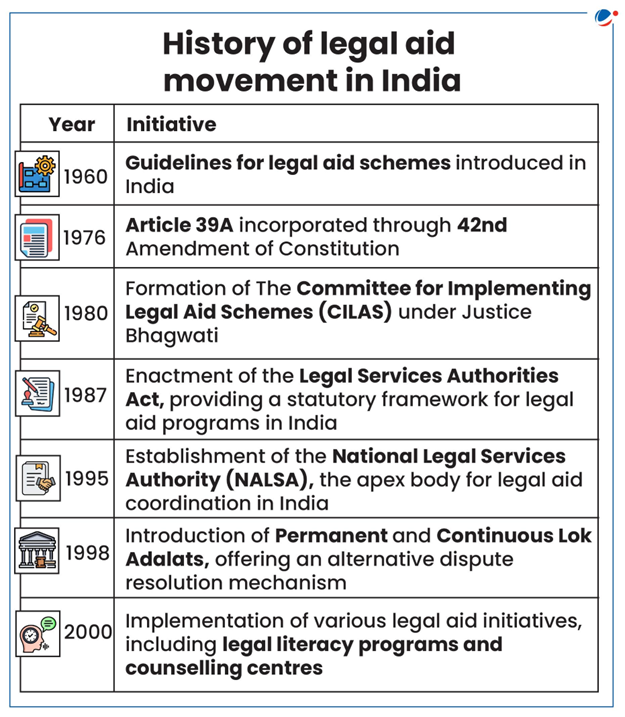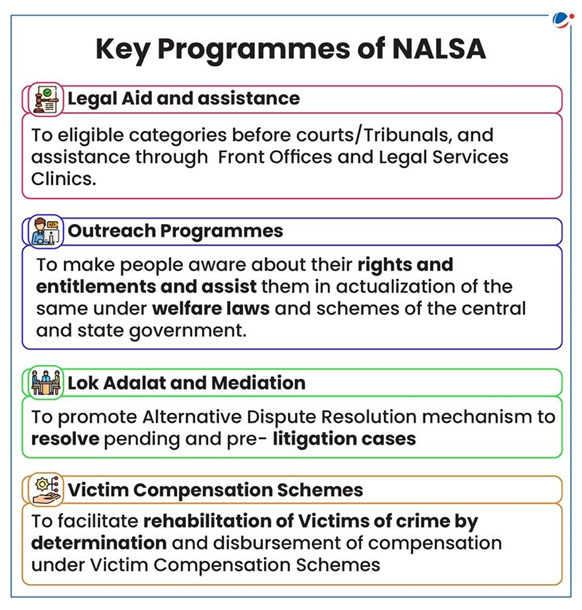Why in News?
Parliamentary Standing Committee submitted its Report on “Review of the working of Legal aid under the Legal Services Authorities Act, 1987”
What is NALSA?
- NALSA, or the National Legal Services Authority, is an apex organization established under the Legal Services Authorities Act, 1987.
- It oversees the implementation of legal aid policies and programs and monitors legal aid activities across India.
- The core principle of NALSA in India is to ensure that the impoverished and underprivileged have access to justice through the provision of free legal services.
- The legal aid under it is applicable to Courts, tribunals, and other bodies with judicial or quasi-judicial powers.
- It also promotes Settlement of Disputes through Alternate Dispute Resolution (ADR) Mechanisms.
- Central Government allocates annual funds to NALSA, distributed to State and District Legal Services Authorities.
- State Governments cover state-level expenses, including salaries.
- The weaker sections covered under Section 12 of the law include:
- Women and Children
- Members of Scheduled caste or Scheduled Tribes
- Industrial Workmen
- Persons with Disability
- Persons in Custody
- Victims of Human trafficking
- Victims of Natural Disasters, Ethnic/caste violence, industrial Disaster
- Persons with an annual income of less than Rs 1,00,000/- Or as notified by the Central/State Governments
- NALSA grants authority to oversee legal aid initiatives to:
- Legal Services Authority at National/State/District Level
- Taluka/Sub divisional Legal Services Committee
- High court and Supreme Court Legal Services Committees

Functions of NALSA
- Legal Aid and Assistance: It includes advocate representation, process fee payments, document preparation, including drafting and translation, and provision of certified copies of legal documents in proceedings.
- Participation in PILs litigation for social justice on behalf of the marginalized under Section 4(d) of the Legal Services Authorities Act
- The protection of fundamental rights of the abandoned and destitute women/widows in Vrindavan. Ex: The NALSA vs. Union of India (2014) recognizes transgenders to be the third gender.
- Lok Adalats and Mediation: Aimed at resolving legal disputes expeditiously and amicably, thereby reducing the burden on the formal judicial system.
- Legal Awareness: To promotes legal literacy through various means, including seminars, pamphlet distribution, television and radio appearances, internships for law students, and Legal Aid Clinics in colleges etc.
- Victim Compensation: Through schemes like “Compensation Scheme for Women Victims/Survivors of Sexual Assault/other Crimes” NALSA aims to provide compensation and support to women who are victims or survivors of sexual assault or other crimes.

Constitutional Provisions related to Free Legal Aid
|
Issues identified in report and Key recommendations
Issues | Recommendations/Observations |
|
|
|
|
|
|
|
|
|
|
|
|
Government Initiatives for legal aid
|



